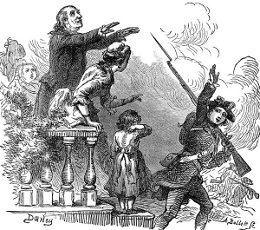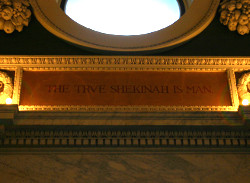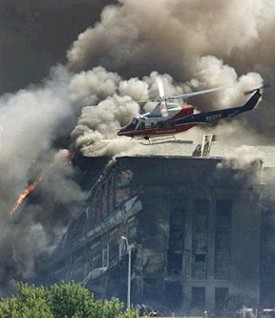In Church Attics, Clues to the Private Life of Early America
Body
“There is no other discrete set of sources that will similarly transport us into colonial America”
As iron sharpens iron,
one person sharpens another. (Proverbs 27:17)
“There is no other discrete set of sources that will similarly transport us into colonial America”
“To acknowledge that England was Catholic in the fifteenth century and Protestant by the seventeenth century, and then to deny that America had a Christian beginning seems pretty naive.” Christian nation? Part 1: Mark Noll, George Washington, and revisionism
[amazon 0062065130 thumbnail]
Reprinted with permission from As I See It, which is available free by writing to the editor at [email protected]
President Ronald Wilson Reagan (1911-2004) is known as “the Great Communicator” not merely because he had the polished delivery of an accomplished actor, but because he actually had something substantial to say and often said it very well (“Mr. Gorbachev, tear down this wall!”).
Among the tools of effective communication is the employment of suitable quotes, aphorisms and stories to illustrate or drive home a point or to clarify an idea. Mr. Reagan had a sizeable private stash of quotes and quips and jokes that he had accumulated over the decades, all written out by hand on 4” x 6” cards, ready to be accessed as needed. This stack of cards was kept close at hand in his personal desk drawer for easy reference. At his death, the contents of his desk were boxed up and deposited in the Reagan Presidential Library in California. During some renovations in 2010, this stack of hand-written cards was rediscovered, and a selection of them is herein compiled and published.
The quotes, stories and jokes are divided up into nine sections, viz., “On the Nation,” “On Liberty,” “On War,” “On the People,” “On Religion,” “The World,” “On Character,” “On Political Theater,” and “Humor.” These are followed by a “glossary”—really a brief description of named authors quoted—and a topical index.
Many of the quotations are outstanding—I quote a few of the crème de la crème below (having to leave out many very good ones), but unfortunately, none is documented in the book beyond naming the original author. Reagan’s cards did not provide chapter and page references, but the editor should have, as far as he was able, provided documentation.

The Utility of the Union as a Safeguard Against Domestic Faction and Insurrection (continued)
by James Madison
To the People of the State of New York:
AMONG the numerous advantages promised by a well constructed Union, none deserves to be more accurately developed than its tendency to break and control the violence of faction. The friend of popular governments never finds himself so much alarmed for their character and fate, as when he contemplates their propensity to this dangerous vice. He will not fail, therefore, to set a due value on any plan which, without violating the principles to which he is attached, provides a proper cure for it. The instability, injustice, and confusion introduced into the public councils, have, in truth, been the mortal diseases under which popular governments have everywhere perished; as they continue to be the favorite and fruitful topics from which the adversaries to liberty derive their most specious declamations. The valuable improvements made by the American constitutions on the popular models, both ancient and modern, cannot certainly be too much admired; but it would be an unwarrantable partiality, to contend that they have as effectually obviated the danger on this side, as was wished and expected. Complaints are everywhere heard from our most considerate and virtuous citizens, equally the friends of public and private faith, and of public and personal liberty, that our governments are too unstable, that the public good is disregarded in the conflicts of rival parties, and that measures are too often decided, not according to the rules of justice and the rights of the minor party, but by the superior force of an interested and overbearing majority. However anxiously we may wish that these complaints had no foundation, the evidence, of known facts will not permit us to deny that they are in some degree true. It will be found, indeed, on a candid review of our situation, that some of the distresses under which we labor have been erroneously charged on the operation of our governments; but it will be found, at the same time, that other causes will not alone account for many of our heaviest misfortunes; and, particularly, for that prevailing and increasing distrust of public engagements, and alarm for private rights, which are echoed from one end of the continent to the other. These must be chiefly, if not wholly, effects of the unsteadiness and injustice with which a factious spirit has tainted our public administrations.
 Something doesn’t add up. We refer to July 4 as Independence Day. We refer to the war that followed as the Revolutionary War. But if we viewed ourselves as independent of British rule on July 4, how could we have engaged in revolution after July 4? Revolution normally precedes independence. Either the day or the war is a misnomer.
Something doesn’t add up. We refer to July 4 as Independence Day. We refer to the war that followed as the Revolutionary War. But if we viewed ourselves as independent of British rule on July 4, how could we have engaged in revolution after July 4? Revolution normally precedes independence. Either the day or the war is a misnomer.
For Christians the incongruity raises deeper questions. Given the response to government that Scripture requires, shouldn’t we oppose the whole idea of revolution, regardless of the circumstances? And if we’re opposed to revolution, can we rejoice in independence?
Genesis 9 is understood by many to represent God’s re-founding of the institution of human government. The NT emphasizes submission to that institution as our Christian duty.
And He said to them, “Whose image and inscription is this?” They said to Him, “Caesar’s.” 17 And Jesus answered and said to them, “Render to Caesar the things that are Caesar’s, and to God the things that are God’s.” And they marveled at Him. (Mark 12:16–17)
Remind them to be subject to rulers and authorities, to obey, to be ready for every good work… (Titus 3:1)
Therefore submit yourselves to every ordinance of man for the Lord’s sake, whether to the king as supreme, 14 or to governors, as to those who are sent by him for the punishment of evildoers and for the praise of those who do good. 15 For this is the will of God, that by doing good you may put to silence the ignorance of foolish men. (1 Peter 2:13–15)

 On “11 Sep 01” I was stationed at Andrews Air Force Base, Maryland. (Former military will recognize the dating convention.) For those unfamiliar with Andrews, it is in Maryland on the outskirts of Washington, DC and is most famous for housing Air Force One. “Ah, now it rings a bell,” you say.
On “11 Sep 01” I was stationed at Andrews Air Force Base, Maryland. (Former military will recognize the dating convention.) For those unfamiliar with Andrews, it is in Maryland on the outskirts of Washington, DC and is most famous for housing Air Force One. “Ah, now it rings a bell,” you say.
I was in charge of our base’s alcohol and drug rehabilitation services, and 11 September started out an uneventful day like any other. The patients (in my business the more politically correct term is “clients”) had gone down for a smoke break. Almost all recovering addicts smoke. Go figure. They came back frantically instructing us to turn on the TV. An airplane had hit the World Trade Center. Needless to say, not much more rehabbing got done that day.
We were all, clients and staff, watching live as the second plane flew into the South Tower. What had been speculated about and suspected, terrorism, was confirmed. What happened after that could best be described as ordered chaos.
The base went on complete lock down. Threatcon delta, I believe, was the designation. No one could come or go. If I remember correctly, the hospital was also locked down. Neither patients nor staff could leave. I was able to contact my wife, who had been instructed by base police to stay inside, but cell phone communication was sporadic at best and many patients were unable to get in touch with loved ones—a fact which didn’t exactly help lower the anxiety level. Parents on the base were particularly frantic because they couldn’t get their children from the local schools. Thankfully, our kids were home schooled.
Rumors were rampant. One that seemed to linger for a while was that a bomb had gone off outside the Capitol. We were on the fourth floor and therefore had a good view of the surroundings. At one point we could see smoke rising in the distance. We all assumed this was the Capitol Building. Only later did we come to find out it was actually the Pentagon. In hindsight, I know this makes us all seem directionally challenged, but the circumstances did not lend themselves to thoughtful assessments of geography.
Editor’s Note: This article was reprinted by permission from the IFCA’s Voice magazine (May/June 2009).
 Believers in America are contemplative these days. Though confident in the workings of a sovereign God who rules over the kingdoms of men, their mood has become increasingly somber as the political and economic pendulum has swung out of reach.
Believers in America are contemplative these days. Though confident in the workings of a sovereign God who rules over the kingdoms of men, their mood has become increasingly somber as the political and economic pendulum has swung out of reach.
Is this a hiccup for America or a heart attack? Are our freedoms threatened or just our values and traditions? How should believers balance national and eternal interests? Are civic and spiritual tied together? How can one best serve his or her country as a Christian citizen?
I believe that if we reorient our thinking we can cheat the pensive gloom and rekindle hope. To do this, we must first explore the Creator’s principles in the ancient text of the Bible, and then take a walk back through patriot alley to explore the principles underlying this grand experiment called America. When we do, we will discover that we the people are the king, but that we the people / the king has a heart disease only the Great Physician can heal.
Discussion